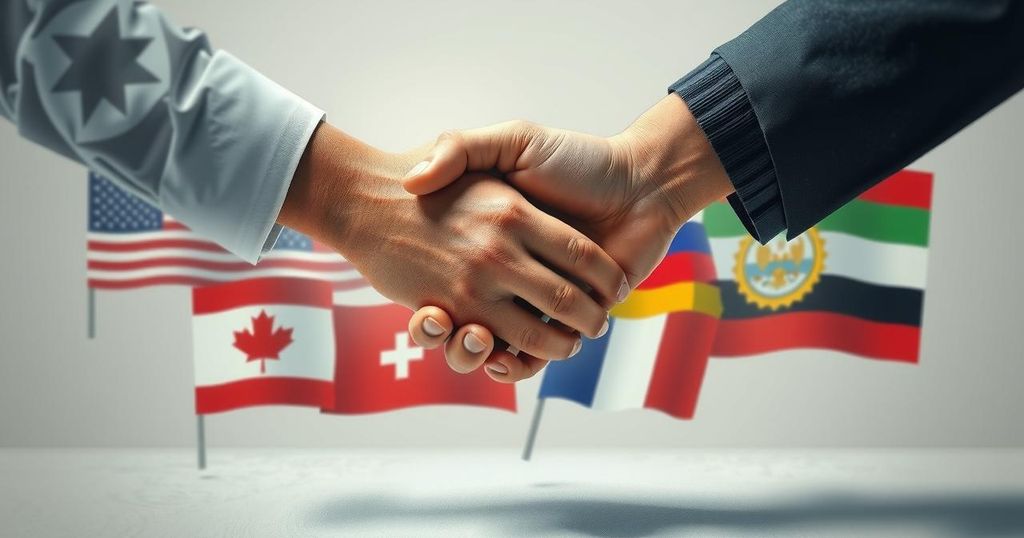Qatar reaffirmed its support for Lebanon, particularly following recent political changes. Prime Minister Sheikh Mohammed bin Abdulrahman Al Thani emphasized the importance of stability and aid for the Lebanese Army, expressing hope for economic cooperation. His visit underscored Qatar’s commitment to supporting Lebanon’s energy needs and investment projects, enhancing bilateral relations amidst challenges.
The Qatari Prime Minister, Sheikh Mohammed bin Abdulrahman Al Thani, reaffirmed Qatar’s steadfast support for Lebanon across various sectors during his recent visit. He emphasized the importance of stability following the presidential election and urged enforcement of Resolution 1701 to ensure the withdrawal of Israeli forces from Lebanese territory. The Prime Minister also confirmed Qatar’s commitment to bolster the Lebanese Armed Forces, particularly in light of the new government formation.
This visit marked Al Thani’s first official trip to Lebanon after significant political changes, including General Joseph Aoun’s election as president. During his media briefing, he expressed Qatar’s desire to facilitate economic discussions and investments in Lebanon, contingent on the establishment of a new government. Al Thani articulated, “The State of Qatar is always present and seeks… to fulfil its duty towards the brotherly Lebanese people.”
Lebanese journalist May Farhat pointed out that President Aoun has expressed deep gratitude for Qatari support in enhancing Lebanon’s economy, especially in the oil and gas sector. Al Thani assured Lebanon of continued energy supplies for power generation and highlighted Aoun’s efforts to resume exploration activities with TotalEnergies, which may focus on the strategically significant Block 9.
Farhat noted Qatar’s potential revival of investment projects in Lebanon’s electricity sector aimed at alleviating the ongoing energy crisis. She observed that previous Qatari initiatives had been obstructed by political interests but expressed hope for renewed collaboration under the present administration.
Dr. Ali Al-Hail, a political analyst, stressed the significance of Qatar’s support, indicating that it has been providing substantial aid to Lebanon, particularly to the Lebanese Army. Al-Hail discussed the implications of Qatar’s choice to back Aoun, viewing it as a strategic move to stabilize Lebanon amidst a political vacuum. He regarded the support as essential for the integrity of the Lebanese Armed Forces, highlighting Qatar’s prioritization of Lebanese stability.
He indicated that forthcoming Qatari investments in Lebanon could span various sectors, including tourism. The overarching sentiment is one of mutual trust and commitment between Qatar and Lebanon, fostering hope for a productive partnership moving forward.
Qatar’s relationship with Lebanon has been defined by a commitment to support various sectors, especially amid political transitions. Recent changes, including the election of General Joseph Aoun as president, have provided a framework for renewed bilateral cooperation. Qatar’s support focuses on strengthening Lebanon’s military capabilities and facilitating economic investments to address the country’s ongoing crises and instability. The significance of Qatari investments in Lebanon, particularly in the energy sector, demonstrates Qatar’s desire to play a pivotal role in stabilizing Lebanon’s economy and enhancing its infrastructure amidst challenges. With political dynamics constantly evolving, Qatar aims to adapt its support to suit Lebanon’s needs, fostering long-term partnerships that bolster both countries’ interests.
In conclusion, Qatar’s ongoing commitment to supporting Lebanon is evidenced through its backing of the Lebanese Armed Forces and aspirations for revitalizing the economy through strategic investments. The visit by Qatari Prime Minister Sheikh Mohammed bin Abdulrahman Al Thani heralds a renewed hope for collaboration between the two nations. As Lebanon navigates its political landscape, Qatar remains a vital ally dedicated to fostering stability and efficient governance, amplifying mutual interests for growth and development.
Original Source: www.intellinews.com






